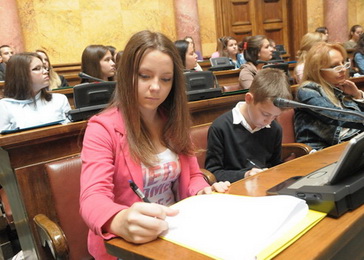 Author: Dražen Zacero (Social Inclusion Blog)
Author: Dražen Zacero (Social Inclusion Blog)
At the request of Friends of Children of Serbia and with the help of pedagogue Tatjana Matijaš I prepared a short questionnaire, in order to examine the capabilities of student parliaments in the field of social inclusion and poverty reduction. I designed the questionnaire intuitively, keeping most of the question open, to get the most authentic opinions from the children.
– If you gather a dozen children aged 14 to 18 years, there is nothing an expert might suggest, that is not already on their list of proposals for social inclusion of children with reduced abilities. The conclusion was drawn from the fact that the answers to 10 questionnaires contained all known strategies for social inclusion and poverty reduction, expressed through the language of children.
– Children recognize the significance of psychosocial support.
– Children recognize the significance of maintaining human dignity while providing assistance and support through the solidary activities they most frequently propose. They emphasize these activities need to be done so that their peer does not feel bad or is not insulted.
– Children recognize the influence of peer groups on a person feeling accepted. In 90% of the cases, children note the method they can help is being friends with the child they recognize as having a problem/challenge in life, financial, or not having parents, or being in a wheelchair, etc. An additional quality is that they emphasize that such children should in no way be separated or made to feel different.
Here are some of their opinions regarding peers who are socially excluded or with reduced abilities, expressed as a response to the question how these children are mentioned in their peer group and in what context:
- They are spoken of as children with certain limitations, primarily bad things are said about them, and I would like them to be given a chance like everyone else for everything
- Unfortunately, they are spoken off less, their suffering is never mentioned and they are always called invalids. But I would rather say they are brave, because after everything that happened to them, they wish to be like others.
- We call them invalids, retards. They should be spoken of just like all other people. With respect and in a way where in no way will we overly emphasize their deficiencies.
- They frequently laugh at them and do not want to enter into any type of contact with them. I would like it if we spoke and treated them like all children.
- I describe them as friends, and would like to have them spoken of exactly in that way.
What made the greatest impression on me is that children generally see the least number of problems regarding inclusive education and inclusive classrooms. You will never hear a child say that a person in a wheelchair cannot sit with them in class and be part of the class (…). Education is important, but community is important as well. Even if we say that inclusion in education will slow down learning and teaching, even if we say there are no creative solutions for including a person in a wheelchair in physical education classes, I’d say it is important that we are all together, and then the community will compensate for all deficiencies, i.e. I see inclusion simply as teamwork.
The text in its entirety can be found on the Social Inclusion Blog.
 Government of the Republic of Serbia
Government of the Republic of Serbia















 pdf [271 KB]
pdf [271 KB]
Leave a Comment